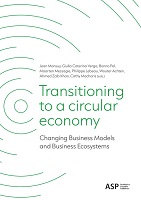Transitioning to a circular economy
Changing Business Models and Business Ecosystems
Contributor(s)
Mansuy, Jean (editor)
Verga, Giulia Caterina (editor)
Pel, Bonno (editor)
Messagie, Maarten (editor)
Lebeau, Philippe (editor)
Achten, Wouter (editor)
Khan, Ahmed Zaib (editor)
Macharis, Cathy (editor)
Language
EnglishAbstract
We are living on a finite planet. Humankind is overstepping planetary boundaries, however. In 2021, worldwide consumption has exceeded the yearly bio-capacity of the Earth (what we call the overshoot day) on the 29th of July. For industrialised countries, the situation is far worse: In 2022, Belgium reached that overshoot day on the 26th of March. In the face of these urgent challenges of sustainable resource use, there is wide agreement on the need for a transition, a fundamental societal shift, towards, amongst others, a circular economy (CE), the focus of this book.
The book speaks deliberately of transitioning. This marks our focus on transition processes and activities. Discussions of ‘the transition’ easily get stuck in abstract visions, remote future goals and ideological statements about the desired world of tomorrow. By contrast, much more attention needs to be paid to concrete transformation processes that could lead towards these projected futures. Transition how? Where to? By whom?
We highlight that companies are key actors in CE transitioning. This edited volume presents key outcomes from the “Transitioning Belgian companies into circularity” research chair, established by Belgian Employers’ Federation FEB/VBO. Whilst focusing on the role of companies, we show how the private sector cannot bring about such societal transformations single-handedly. We consider companies
as embedded transition agents, i.e. as actors that operate as parts of broader business ecosystems.
The book results from collaborative work between researchers from the Vrije Universiteit Brussel (VUB) and the Université Libre de Bruxelles (ULB). Containing contributions by Jean Mansuy, Giulia C. Verga, Bonno Pel, Maarten Messagie, Philippe Lebeau, Wouter Achten, Ahmed Z. Khan, Cathy Macharis, Ela Callorda Fossati and Tom Bauler, it gathers expertise in sustainable urbanism, transition governance,
the redesign of systems, lifecycle analysis, and business model innovation.
Keywords
Circular economy; business; economy;business models; business ecosystems;circular; transitioning;climate;industry;societyDOI
10.46944/9789461173942ISBN
9789461173935, 9789461173959, 9789461173942Publisher website
https://www.aspeditions.be/en-gb/home.htmPublication date and place
Brussel, 2022Classification
Business ethics and social responsibility
Business and the environment; ‘green’ approaches to business
Climate change


 Download
Download Web Shop
Web Shop